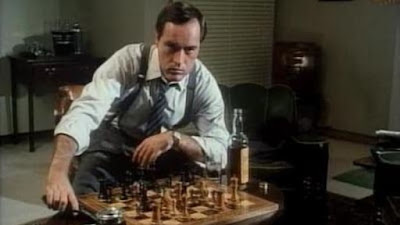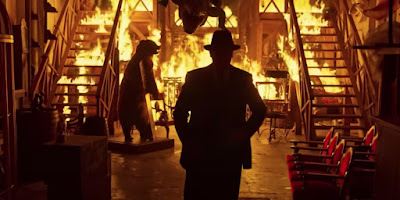or
A Tarantula on an Angel Food Cake
A Tarantula on an Angel Food Cake
I have read everything by Raymond Chandler—the novels, the short-stories, the essays—and I've always loved his writing. His plots sometimes suffered, but the writing...the prose. The hysterical metaphors. There was a bemused humor behind the familial carnage that Chandler cranked out, and a jaded realization that behind every fortune there was some crime involved, and that, if you looked close enough, Tinsel-town was as rusty an old scow. What Chandler wrote was thrilling, even if the plots were mundane, with a depth of consciousness and virtue that a lot of pulp-writers couldn't be bothered with.
Chandler wrote: “Without magic, there is no art. Without art, there is no idealism.
Without idealism, there is no integrity. Without integrity, there is
nothing but production." Philip Marlowe, Chandler's private detecting knight in crusted armor could have easily said those words, but he wouldn't. Especially the "magic" part. Marlowe would be watching the hands and checking for wires, and be amused while he was doing it. Like his perpetual solo chess-games.
And I've written a lot about Chandler here: the movies—a lot of them—and I had a deep affection for the TV series out of Canadian TV and HBO decades ago, the ones that starred Powers Boothe as "Philip Marlowe, Private Eye." Marlowe's a good part and most people are good at playing him—Bogart, Powell, Mitchum, both Montgomery's, Garner—even Elliott Gould had a nice "take" on the character, although director Robert Altman seemed to think of Marlowe as an out-of-date fool—"Rip Van Marlowe", he called him. So, Marlowe is good for the most part.
But, you can get Chandler wrong. One has to merely look at Michael Winner's remake of The Big Sleep, with Mitchum (who came to the part late), for what "stands out like a tarantula on an angel food cake." The money for that production came from Lord Lew Grade, so (of course) it had to be set in England. Metaphorically speaking, it's the wrong side of the road. America—and Los Angeles, in particular—was young and finding its feet, exploding with development and cash (but no water) but (changing tenses here) with the rush of money comes an emotional adolescence, that one couldn't conceive of in "old money" families. Every family has a black sheep, or secret. But, there are usually structures in place to keep everything "in house." Marlowe's job was usually to roust the cattle after the proverbial barn-door was left negligently open.
Marlowe, the latest film with the character—titular because the source novel, "The Black-Eyed Blonde"* (written by John Banville under the nom de plume Benjamin Black) has a title that implies abuse—tries to evoke the period and the convoluted scenarios that Marlowe regularly skulked, but is a misfire in so many ways that one is just tempted to ash-can with the couple other bad adaptations that have rumbled down the boulevard over the years. And one should state the obvious first: Neeson is too old to be playing Marlowe. True, there is less stunt-work needed to be done, so it's more suitable for the actor's age, but Marlowe was a perpetual 37-45 in the books. Mitchum was too old to play him at 57 in Farewell, My Lovely. Neeson is 70. It makes the redundant smashing of a chair over an already out-cold sparring partner entertainingly apt, but this Marlowe is decades too old to be duking it out with thugs and peeping through people's windows. Marlowe would regularly have his bell rung in the books, but this is the first time I've ever worried about him breaking a hip. There's a difference between being world-weary and just-plain haggard.
And, yes, the film is financed by Irish firms for Irish artists—Neil Jordan directs—but Neeson is also too Irish to be playing Marlowe, his Americanisms slipping with "yer's" and dropped "g's" (although accents usually don't bother me). He wears a three-piece suit—which I can't imagine Marlowe doing unless it was a formal dinner—and (for cryin' out loud), he has a secretary in the office. Marlowe was too loan-wolfish and, more importantly, not that successful to afford one.
They got the louvers right...
The story (adapted by William Monahan, who hasn't done an improvement on anything except The Tender Bar) is not much: Clare Cavendish (Diane Kruger) is shown into Marlowe's office ("How private are you?") with a job that requires discretion: her lover Nico Pederson (François Arnaud) has disappeared and she wants to know what happened to him without alerting her jerk of a husband. Nico was doing some studio work, but also had a, shall we say, "importing business" as well, the likes of which involve local crime-boss Lou Hendricks (Alan Cumming), local "bordello" manager Floyd Hanson (Danny Huston), a well-connected studio-head (Mitchell Mullen), who just happens to be involved with star Dorothy Quincannon (Jessica Lange, who is doing a tremendous job at the start of her "Kate Hepburn" eccentricity-acting phase). To paraphrase the detective: So many relations, so few brains. You could figure things out, just by following the strings attached.
Any joys are few and far between: everybody smokes, the women all have shellaced permanent waves, and sometimes the location work done in Barcelona, Spain could make you believe they found some un-gentrified corner of Los Angeles—if you squinted through the bottom of a half-empty shot-glass, that is. It doesn't quite pencil and smacks of trying to stretch a budget until you hear it snap. That stuff's always trouble. And the dialog by everybody is too clever by-half. You want them to just talk without being so damned witty. There is a nice line of dialog as Cavendish exits Marlowe's office, "You're very perceptive and sensitive, Mr. Marlowe. I imagine it gives you trouble."
I imagine a better movie, maybe finding something a little closer to home, maybe with Ron Livingston or Kyle Chandler as Marlowe, and fewer Chinatown call-backs (although the movie-eye-make-up bit produced a snort out of me). I imagine a lot of things, but I can't imagine a duller version of Chandler—or Banville—than this one.
* "The Case of the Black-Eyed Blonde" was the 37th episode of the Raymond Burr "Perry Mason" series, based on Earle Stanley Gardner's 25th book, published in November, 1944.









No comments:
Post a Comment